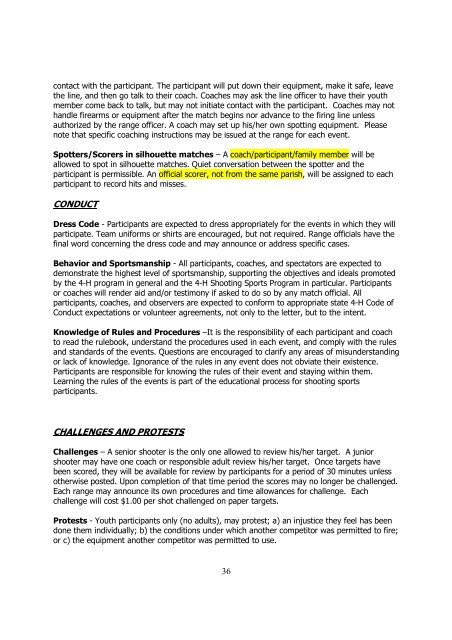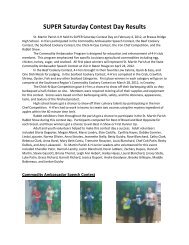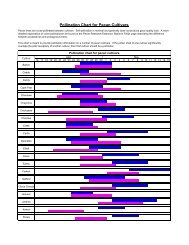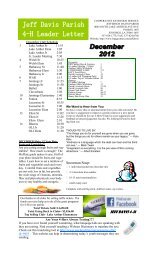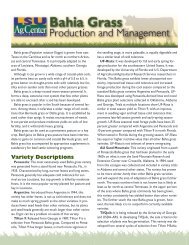2013 Handbook - The LSU AgCenter
2013 Handbook - The LSU AgCenter
2013 Handbook - The LSU AgCenter
Create successful ePaper yourself
Turn your PDF publications into a flip-book with our unique Google optimized e-Paper software.
contact with the participant. <strong>The</strong> participant will put down their equipment, make it safe, leave<br />
the line, and then go talk to their coach. Coaches may ask the line officer to have their youth<br />
member come back to talk, but may not initiate contact with the participant. Coaches may not<br />
handle firearms or equipment after the match begins nor advance to the firing line unless<br />
authorized by the range officer. A coach may set up his/her own spotting equipment. Please<br />
note that specific coaching instructions may be issued at the range for each event.<br />
Spotters/Scorers in silhouette matches – A coach/participant/family member will be<br />
allowed to spot in silhouette matches. Quiet conversation between the spotter and the<br />
participant is permissible. An official scorer, not from the same parish, will be assigned to each<br />
participant to record hits and misses.<br />
CONDUCT<br />
Dress Code - Participants are expected to dress appropriately for the events in which they will<br />
participate. Team uniforms or shirts are encouraged, but not required. Range officials have the<br />
final word concerning the dress code and may announce or address specific cases.<br />
Behavior and Sportsmanship - All participants, coaches, and spectators are expected to<br />
demonstrate the highest level of sportsmanship, supporting the objectives and ideals promoted<br />
by the 4-H program in general and the 4-H Shooting Sports Program in particular. Participants<br />
or coaches will render aid and/or testimony if asked to do so by any match official. All<br />
participants, coaches, and observers are expected to conform to appropriate state 4-H Code of<br />
Conduct expectations or volunteer agreements, not only to the letter, but to the intent.<br />
Knowledge of Rules and Procedures –It is the responsibility of each participant and coach<br />
to read the rulebook, understand the procedures used in each event, and comply with the rules<br />
and standards of the events. Questions are encouraged to clarify any areas of misunderstanding<br />
or lack of knowledge. Ignorance of the rules in any event does not obviate their existence.<br />
Participants are responsible for knowing the rules of their event and staying within them.<br />
Learning the rules of the events is part of the educational process for shooting sports<br />
participants.<br />
CHALLENGES AND PROTESTS<br />
Challenges – A senior shooter is the only one allowed to review his/her target. A junior<br />
shooter may have one coach or responsible adult review his/her target. Once targets have<br />
been scored, they will be available for review by participants for a period of 30 minutes unless<br />
otherwise posted. Upon completion of that time period the scores may no longer be challenged.<br />
Each range may announce its own procedures and time allowances for challenge. Each<br />
challenge will cost $1.00 per shot challenged on paper targets.<br />
Protests - Youth participants only (no adults), may protest; a) an injustice they feel has been<br />
done them individually; b) the conditions under which another competitor was permitted to fire;<br />
or c) the equipment another competitor was permitted to use.<br />
36


